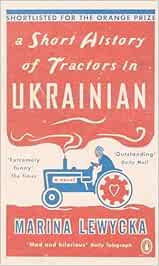3.5 Stars
Because of recent events in the Ukraine, I found myself looking for Ukrainian fiction translated into English. My search uncovered this book by a British novelist of Ukrainian background. Its quirky title appealed, and I discovered it appeared on the 2005 Booker Prize longlist and Orange Prize shortlist.
The novel is narrated by Nadia whose 84-year-old widowed father Nikolai has fallen in love with Valentina, a 36-year-old Ukrainian divorcee. Nadia has been estranged from her older sister Vera but the two join forces to stop the marriage and, when that doesn’t work, to have Valentina deported. Nikolai is infatuated with the glamorous woman with “superior breasts,” but they believe Valentina has married Nikolai for the money she believes he has, so she can remain in Britain, and so her teenaged son can receive a good education. The sisters’ visits to their family home show Valentina physically and psychologically abusing Nikolai who finds comfort in writing his history of tractors, passages from which are interspersed throughout the narrative.
Many reviewers have commented on the humour in the book. There is humour: Nikolai describes his marriage to Valentina as a matter of balance, like finding the correct ratio between lift and drag in the design of an aircraft wing, and Nadia comments that Valentina “’has plenty of uplift but she’s a bit of a drag.’” But I didn’t find the book side-splittingly hilarious because of the serious overtones. There is some comedy in Nikolai’s being besotted with a much-younger woman, but Valentina’s treatment of Nikolai can only be called elder abuse. The arrival of Valentina also brings “to the surface a sludge of sloughed-off memories, giving the family ghosts a kick up the backside.” These memories of life in Ukraine in the first half of the 20th century are not in any way humourous. I think one of Nadia’s comments is apropos: “I had thought this story was going to be a knockabout farce, but now I see it is developing into a knockabout tragedy.”
Nikolai arrived in England after World War II as a refugee. His memories of life in Ukraine include several events in Ukraine’s history: Stalin’s purges, the Holodomor, Babi Yar, and Nazi occupation. There is not a great deal of detail but sufficient to convey the nature of each catastrophe and to inspire readers to seek further information in non-fiction sources. Certainly, one becomes aware of the complicated relationship between Ukraine and Russia. Through the course of the novel, Nadia learns more about her parents’ history and comes to understand how they were shaped by history and how Vera’s pessimistic views of people’s natures originated in her experiences as a War Baby.
What is impressive about the characterization is that though none of the main characters are likeable, they do arouse some sympathy. For instance, Vera describes Valentina as “’a tart. And a criminal. But still, I had to admire her.’” Nadia admits that Valentina is a complex person: “slaving long low-wage shifts in the nursing home, behind the bar at the Imperial Hotel, toiling in my father’s bedroom. Yes, she is greedy, predatory, outrageous, but she is a victim too. A source of cheap labour.” Valentina resorts to criminal activity to get comfort and security for her son but “’Women have always gone to extremes for their children. . . . Wouldn’t Mother have done the same for us, Vera? If we were desperate? If there was no other way?’”
Nikolai has not always behaved admirably in the past, but Nadia comes to realize that he did what was necessary to survive. Her father can be seen as a dirty old man, but it is impossible to ignore his loneliness and desire for happiness: “I had thought there was a happy story to tell about my parents’ life, a tale of triumph over tragedy, of love overcoming impossible odds, but now I see that there are only fleeting moments of happiness, to be seized and celebrated before they slip away.”
When newscasts bring
only catastrophic news from Ukraine, there are elements in this book that resonated. I see Ukrainian refugees crossing into Poland
at Przemysl where Nikolai and his family crossed as well. I see the Ukrainian flag everywhere: “two oblongs of colour, blue over yellow –
yellow for the cornfields, blue for the sky.”
Were Nikolai to add another chapter to his book, he’d undoubtedly write
about ploughshares being turned into swords again as war refugees once again
flee Ukraine. Please let there be more
Peacetime Babies than War Babies.
Though it may be advertised as a comic book, this novel shows how history affects people.

As a Ukrainian I appreciate your choice! I do shy away from books where none of the main characters are likeable though. But this sounds compelling.
ReplyDelete